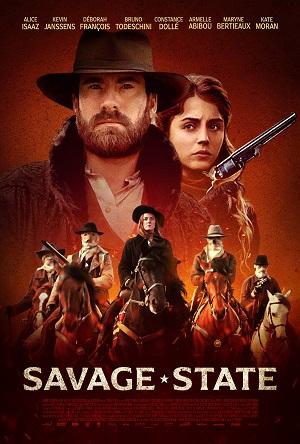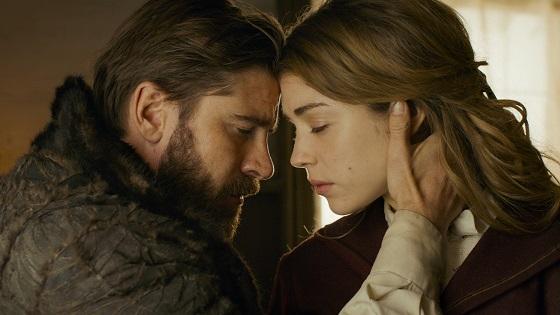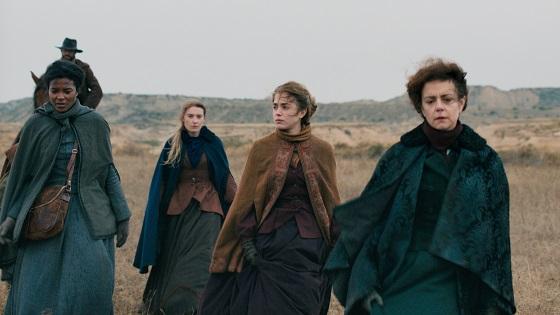

[Rating: Rock Fist Way Down]
On Demand and Digital Friday January 29.
Narratively vacant, historically nonsensical, and emotionally barren, it is hard to imagine a film doing worse for itself than Savage State (French: L’état sauvage). Devoid of any consistent sense of time or place, and without a single relatable or likable character to lead the story’s charge, the movie just kind of lurches forward from one moment to the next. There’s some beautiful cinematography and a handful of decent performances, to be sure, yet none of it comes together in any meaningful way and is overshadowed by character and narrative contrivances that fail on multiple levels.
The basic skeleton of Savage State follows a transplanted French family living just outside of St. Louis, Missouri in November 1863, and their journey to New York City to catch a boat back to Europe. The family consists of a mother, father, and three teenaged daughters, all of whom are spooked by the increasingly aggressive Union troops in the area. Since the position of the French government during the American Civil War was one of strict neutrality, and because family patriarch Edmond (Bruno Todeschini) just fouled up a blood-soaked smuggling deal, the decision is made to get out of the country while they still can.
Although they’re a wealthy family, Edmond decides for reasons that are not at all clear to walk his brood the roughly 1,000 miles to NYC, wagon-train style, employing smuggling deal survivor, Victor (Kevin Janssens), as their guide/trail boss. Victor was trying to buy contraband perfume for Edmond in the opening minutes of the movie, and only narrowly survived the encounter when the Fence, a mysterious woman named Bettie (Kate Moran), got wise to a double-cross and started shooting. During the family’s journey east they have to deal not only with the elements, but also a Victor-obsessed Bettie, who tracks them because she’s horny or something.

No, seriously: the major conflict of this story hinges on Bettie meeting Victor and developing a life-and-death crush on him in roughly 90 seconds. If that doesn’t make much sense, at least it’s in good company, because nothing about Savage State or the world it occupies adheres to any kind of logic or basis in historical reality. Edmond and family live comfortably in a Union state and in an area that did not see any significant hostile action during the American Civil War. Although Union soldiers did raise some hell during the conflict, the damage was overwhelmingly limited to property, livestock, and materiel, and most importantly, took place in Confederate territory.
A neutral French family living in a Union state wouldn’t have anything to worry about as it concerned Union soldiers, robbing the film of its primary conceit. Although the script, penned by director David Perrault, makes mention of Union General Benjamin Butler’s infamous General Order 28 (which effectively labeled disrespectful women as prostitutes), this was issued 18 months prior and for an occupied military district 700 miles away. It would have no bearing whatsoever on Missouri, and again, even if it somehow did, Union troops terrorizing citizens there would be akin to British soldiers roughing up London residents during The Blitz.
It’s not just the history of the era that comes off as slap-dash and half-baked, but the geography of the setting as well. During the family’s journey east, the landscape reflects a western desert setting at times (an odd choice for northern-Missouri and southern-Illinois), and verdant green valleys during others. Character-wise, there are attempts to develop the primary figures of the story by working in a love triangle between Edmond, his wife (Constance Dollé), and the family’s African-American maid, Layla (Armelle Abibou), yet this comes and goes throughout Savage State, and never develops into anything with a meaningful payoff.

This narrative diversion isn’t just a waste of time, either, it’s socially callous and historically misinformed. Layla practices a cartoonish amalgam of Voodoo and Santeria, making her less of a real character and more of a classic evil/magic “other” archetype. It’s a plot-point that does little for the overall story (despite a forced coda at the end that tries to give it some narrative purpose) and displays a level of cultural insensitivity that runs throughout the picture. Indeed, all the women in Savage State exist only for the sake of lusting after men, with the inexplicable budding romance between Victor and Edmond’s daughter, Esther (Alice Isaaz), serving as the most egregious example of this.
Is this a movie about Victor and Esther, Victor and Bettie, or Layla and Edmond? Slogging through this humorless, self-important drama doesn’t provide any answers, only more questions (who were the guys in the masks, why didn’t Edmond and co. take a train, how did one of the porters know the lyrics to “Home on the Range” 11 years before it was written, and where did these people get cartridge-fed coach guns in 1863?). If the history makes no sense, and the geographic setting doesn’t adhere to anything in reality, a compelling story about sisterhood, revenge, or even love during wartime might have buoyed the larger effort, yet none of these plot threads or the characters underpinning them develop, either.
Cinematographer Christophe Duchange should be credited for at least making this a pleasing visual experience, capturing the stark beauty of the North American frontier despite some tricky lighting hurdles (lots of shadows). The quality of acting varies, from the comically stoic Janssens, who comes off as Jim Carrey doing a Clint Eastwood impression, to the entirely respectable Isaaz and Abibou, who steal every scene they are in. They can’t help Savage State any more than a ceiling fan can help someone dying of thirst, however, doing little more than offering some small comfort to a thing already doomed.





Comments on this entry are closed.